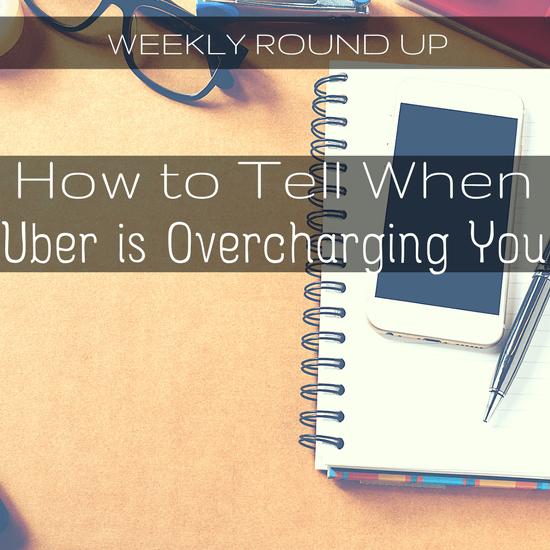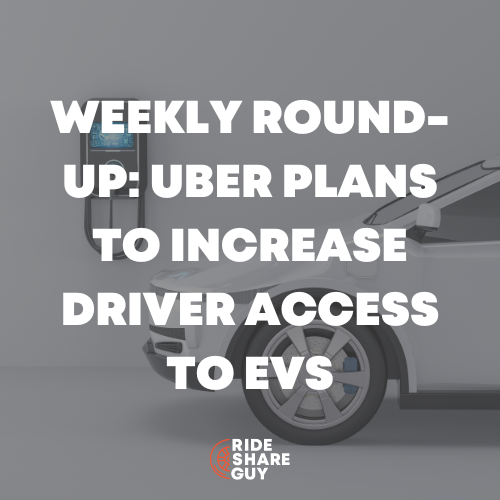Harry here. This week, senior RSG contributor John Ince updates us on Uber’s upfront pricing, a new initiative in NYC to force Uber to add a tipping option and more.
How to tell when Uber is overcharging you [Quartz]
Sum and Substance: Late one night in January I took an UberPool home from a bar in Brooklyn. The on-demand car-pooling service Uber launched in 2014 is still a novelty in a city historically dominated by yellow cabs and the other two passengers in my car peppered our driver, Kevin, with questions. They were curious whether he liked working for Uber, and how much he would make for our three-stop journey.
I was the last drop-off that night, and I asked Kevin if I could stick around to compare what he earned with what we had paid. He agreed, so we sat in his car and waited for the trip summary to appear. Once it did, we noticed something odd: Uber had charged me $11.46, but it told Kevin my fare was $10.26, of which he got $7.30. The difference—$1.20, or 10% of what I paid—was unaccounted for. Uber drivers across the US have reported similar discrepancies. Last September, The Rideshare Guy, a popular blog for drivers, detailed four instances in which Uber paid a driver based on a lower fare than what it charged to the rider. This February, Martin Dulberg, an Uber driver in Raleigh, North Carolina, sued Uber in federal court in California over similar fare disparities. The class-action suit alleges that Uber is contractually obligated to pay drivers based on the fare charged to passengers, not a separate calculation of miles and minutes driven.
“Because Uber overestimates its initial fee, drivers are paid less than they are contractually entitled to,” the complaint states. Paul Maslo, a lawyer representing Dulberg, said Uber’s response is due April 24. Uber last year debuted “upfront pricing,” a new system in which customers agree to their fare before booking a ride. The model was touted for being more transparent than Uber’s previous fare system, which only let riders view an estimate of their final price.
But upfront pricing isn’t always so upfront. Around the time Uber switched to upfront pricing, several drivers told Quartz they began noticing a delay between when they completed a trip and when the summary of the ride became available. Before that, drivers said these details, which include their earnings after Uber’s commission and other adjustments, used to appear instantly.
“It started around the time they instituted upfront pricing, which just made upfront pricing even more shady in my opinion,” said Harry Campbell, founder of The Rideshare Guy. “I don’t know why there would be a delay other than so that the driver and passenger can’t compare fares.”
Uber said the upfront fares that riders agree to are a “best guess” of what a trip will cost based on time, distance, traffic, and demand, among other factors. Drivers are paid based on the actual length of a trip. Uber said this sometimes results in drivers being paid out of a higher fare than what the passenger is charged upfront. The company declined to provide details on whether these discrepancies net out in Uber’s favor. Ride-hailing is a high-volume, low-margin business, so coming out even a little ahead on these fare variations could have a meaningful impact on Uber’s bottom line.
My Take: More and more accounts of pay discrepancies are appearing on driver message boards and in articles like this. Given Uber’s history with Greyball, Hell and other company initiatives, the allegations that Uber is overcharging passengers on a consistent basis is very plausible.
Drivers are still receiving the actual fare based off time and mileage, but it’s the passengers who are overpaying – what’s your take on all this?
New York City Moves to Require Uber to Provide a Tipping Option in Its App [New York Times]
Sum and Substance: Uber drivers say that a New York City proposal to require Uber to provide a tipping option in its app will prevent them from losing thousands of dollars in wages. New Yorkers have been able to tip a taxi driver by adding a few dollars to their bill before swiping a credit card for years. But they cannot add a tip when they use the popular ride-hailing app Uber. Now officials are moving to require Uber to provide a tipping option in the app. The city’s Taxi and Limousine Commission announced a proposal on Monday requiring car services that accept only credit cards to allow passengers to tip the driver using their card.
“This rule proposal will be an important first step to improve earning potential in the for-hire vehicle industry, but it is just one piece of a more comprehensive effort to improve the economic well-being of drivers,” Meera Joshi, the city’s taxi commissioner, said in a statement. The decision was prompted by a petition from the Independent Drivers Guild, a group representing Uber drivers in New York. The petition, which collected more than 11,000 signatures, argued that drivers were losing thousands of dollars without an easy tipping option….
The lack of a tipping option in Uber’s app has been a sore point for drivers. If new rules are approved in New York, it would be a major change in how Uber runs its business in its largest United States market. Other cities could demand to have the same choice. …
Lyft, Uber’s largest competitor in the United States, has long offered in-app tipping as an option for riders. But Travis Kalanick, Uber’s chief executive, has been one of the largest impediments to adding tipping to the Uber app, according to two people familiar with his thinking who did not want to be identified publicly discussing the company’s internal discussions.
Mr. Kalanick believes the feature — which has already been built, but has yet to be deployed — could add “friction” to the in-app experience, and could potentially make Uber less appealing. It could also bring a sense of guilt to those who do not tip drivers. Some inside the company have lobbied Mr. Kalanick to change his stance, but he has long resisted. New York’s proposal will be formally introduced by July and requires approval by the taxi commission’s board. Before that vote, drivers and passengers will have a chance to speak on the measure at a public hearing.
My Take: This is an interesting and somewhat unexpected development in the long-running controversy over tipping on an Uber ride. It appears that New York City is going to force Uber’s hand on this one. If so, it will be a real life test of Uber’s CEO Travis Kalanick’s judgement. He obviously is the primary reason Uber doesn’t have in-app tipping. His reasoning fits in snugly with the Uber worldview/mindset that puts drivers on a different (lower) plane than passengers. Kalanick feels tipping adds friction and we all know how much techies dislike friction in any form.
Uber slow to boot alleged drunken drivers off the app, state regulators say [San Jose Mercury News]
Sum and Substance: Uber faces more than $1 million in fines after state regulators said the ride-hailing company failed to promptly suspend drivers accused of working while under the influence. In nearly all of the 154 driver DUI complaints regulators reviewed from 2014 and 2015, Uber did not suspend or investigate the driver involved, according to the California Public Utilities Commission, which regulates ride-hailing companies.
In more than five dozen cases, the driver was back on the road and picking up passengers within an hour of being accused of driving while intoxicated, regulators said. The move is yet another blow to Uber, following allegations of sexual harassment and other inappropriate behavior by company managers, a lawsuit accusing Uber of stealing competitor Waymo’s self-driving car technology, and the departure of several high-level employees.
Calling the DUI lapses a serious violation of state rules that placed “passengers and the public at immediate risk,” the commission proposed a $7,500 fine for each of the 151 incidents where drivers weren’t suspended or investigated, bringing the total potential fine to $1.1 million. The commission filed an order opening an investigation into Uber’s practices Tuesday, which was released to the public Wednesday evening.
Uber now has a chance to defend itself before an administrative law judge before a penalty is finalized. Uber reported receiving 2,047 complaints of drivers working while under the influence from August 2014 to August 2015, and said it kicked 574 of those drivers off the app, according to the commission’s order. But when the commission reviewed 154 DUI complaints, it found Uber mishandled 151 of them.
My Take: This story, combined with last week’s story about the safety issues involved with background checks in Boston, really leaves Uber vulnerable on the issue of passenger safety. I’ve seen numerous references on driver message boards concerning drunk drivers or drivers high on various drugs, but they’re not verifiable. But here it appears that there’s pretty clear evidence – 151 out of 154 DUI complaints – that Uber was turning a deaf ear to complaints regarding drunk drivers.
Readers, what do you think of this week’s round up? Are we closer to getting tipping on the Uber app, or do you think TK will fight it? Have you noticed pay discrepancies between your passenger’s fare and what you take home?
-John @ RSG





